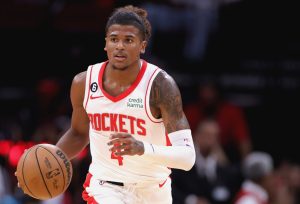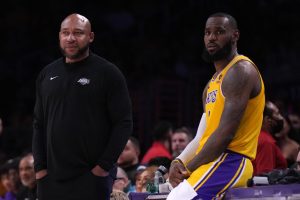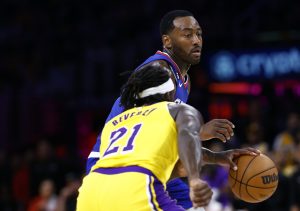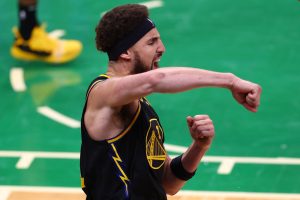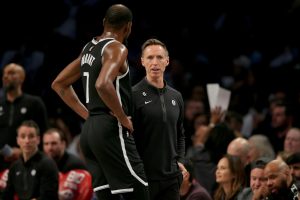After an active free agency, the New York Giants are in an enviable situation in the upcoming NFL Draft. The Giants needed to improve their receiving core and secondary going into the off-season. But by adding receiver Kenny Golladay and cornerback Adoree’ Jackson, the Giants gave themselves flexibility with the 11th overall pick. Without a clear top need, there’s a chance that the Giants trade down.
“It takes pressure off of us going into the draft,” said Giants president John Mara. “We don’t have to take a receiver in rounds one or two; we can sit there and just take the best player available when it comes to our spot.”
The best player available at No. 11 might not be the best fit for New York. Should the Giants trade down, they could accumulate draft capital and still select a surefire Week 1 starter.
The Case for a New York Giants Trade in the 2021 NFL Draft
Available prospects at No. 11 may not make an immediate impact
Five quarterbacks could come off the board in the top 10, leaving many talented players available for the Giants. Tight end Kyle Pitts, tackle Rashawn Slater, middle linebacker Micah Parsons and receiver Jaylen Waddle have all been rumored to get selected by New York.
These top prospects should succeed at the next level, but it would be difficult for them to make a significant impact as rookies for the Giants.
Despite Evan Engram’s struggles in 2020, the Giants signing of former Minnesota Vikings pass catcher Kyle Rudolph signals that the team should be set at tight end. With 2020 first-round pick Andrew Thomas heading into his second year and Nate Solder returning after opting out, it would be tough for Slater to find immediate playing time in New York.
Blake Martinez and Tae Crowder showed promise last year as inside linebackers. Defensive coordinator Patrick Graham would likely start both players, who thrived in Graham’s scheme last year, over Parsons. As for Waddle, slot receiver Sterling Shepard would force him to adjust to playing as an outside pass-catcher, where he could find some trouble due to his size and ability to beat press coverage.
The Giants were just one win away from an NFC East title in 2020, and they should be in divisional contention in 2021 also. But New York needs to bring in instant contributors to improve on their 6-10 record. General manager Dave Gettleman’s free agency spending spree made it clear that the team wants to win now, and using an early first-round pick on a player who will face a limited snap count as a rookie won’t make that happen.
A Giants trade down could solidify the interior offensive line
Meanwhile, the Giants have a glaring need at guard. Kevin Zeitler recently signed with the Baltimore Ravens on a three-year, $22 million deal, leaving the Giants with Shane Lemieux and Will Hernandez. Head coach Joe Judge often rotated both players at left guard last year, hinting at a need for a strong foundation for the interior line. “We put priority on keeping all of our guys fresh, and we’re looking to really develop as many guys as we can,” Judge said in December. “I’d say all three guards, Kevin, Shane and Will, have played well at times. There have been things we want to improve on with our entire unit going across the board.”
It’s up in the air as to whether the Giants will end up exercising Hernandez’s fifth-year option on his rookie contract. And Lemieux, whose 32.2 Pro Football Focus grade was the worst of all qualifying guards in 2020, doesn’t appear to be the answer for an offensive line that needs immediate stability. One of his biggest weaknesses last year was his failure to create leverage as a run-blocker.
On the play linked above, from the Giants 25-23 loss against the Tampa Bay Buccaneers in Week 8, Lemieux didn’t initiate contact with defensive end William Gholston. Instead, Gholston forced his way inside to close Wayne Gallman’s running path and made the tackle. USC guard Alijah Vera-Tucker, the No. 15 overall prospect on NFL.com’s Daniel Jeremiah’s big board, could be an answer. He is great at establishing an advantage at the point of contact through his footwork and hand-fighting. His awareness and strength should make him an instant starter in the NFL.
Jeremiah projects Vera-Tucker to come off the board at No. 19. Many teams above them, such as the Arizona Cardinals (picking at 16th), have greater needs than the interior offensive line. This should limit Vera-Tucker’s stock from rising, giving the Giants a golden opportunity to get their guy while gaining more draft capital.
Impacts of trading down
In his seven drafts as a general manager, Dave Gettleman has never traded down. When asked by the New York Post’s Paul Schwartz in 2020 about trading out of the No. 4 spot, Gettleman showed skepticism. “Trading back has its danger,” Gettleman said. “We’re at four. Let’s say you trade back to eight. There’s only four players we like, what if they’re all gone? Now what are you gonna do? Are you gonna trade back again?”
The Giants could trade back too far and lose out on Vera-Tucker. But this is unquestionably the most draft flexibility New York has had during the Gettleman era. Even in a worst-case scenario, the Giants could fill another need with a late first-rounder while acquiring future draft picks. In a best-case scenario, the Giants could select Vera-Tucker and build draft capital for the near future. Should Daniel Jones flop in his make-or-break season, those picks could form the centerpiece of a trade for a top quarterback prospect.
Last Word
Ultimately, the Giants will likely stay at No. 11. And that wouldn’t be an awful choice. There’s a slew of blue-chip prospects for Big Blue to choose from. But one player doesn’t usually change the fortunes of a team that’s gone through four straight losing seasons. It could serve Gettleman well to explore his options and put the Giants in a position to bring in even more young talent.
Main Photo:
Embed from Getty Images


